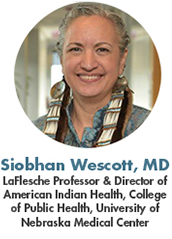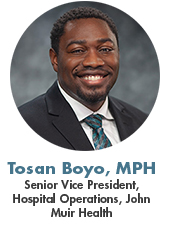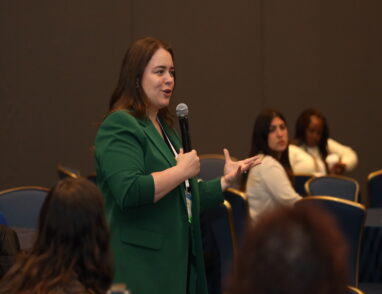Coming to Quality Talks: New Ideas on Health Equity
April 5, 2022 · Andy Reynolds
Quality Talks is only a few weeks away. It’s shaping up once again to be the quality calendar’s most energizing day all year.
We’ve curated a lineup of 10 impressive, thoughtful speakers. They’ve accomplished a lot, aim to accomplish even more, and are full of ideas on how to transform health care.
The three speakers who make up a speaker block we’re calling New Thinking on Population Health and Health Equity are sure to be a highlight of the April 21 event.
Make health equity part of value-based care
 Josh Liao (internist, behavioral scientist, Shakespearean scholar) thinks his fellow reformers are going about value-based care the wrong way.
Josh Liao (internist, behavioral scientist, Shakespearean scholar) thinks his fellow reformers are going about value-based care the wrong way.
He thinks conventional calculations of value ignore the divergent outcomes affecting racial and ethnic minorities. Policymakers and payment gurus shrug off inequitable results as unintended consequences or acceptable tradeoffs when paying for value instead of volume.
A Forbes contributing writer and a cofounder of healthequitypayment.org, Josh is brimming with ideas on how to make care better: End payment incentives that undercut equity. Make it financially rewarding to reduce disparities. And build health equity into the basic math behind value-based payment.
We know of no other young leader who connects core quality goals—payment reform and health equity—as astutely and persistently as Josh. He’s a leader on the rise and definitely one to watch at Quality Talks.
A new understanding of population health
 For a novel view of population health in America, consider what population health means for Native Americans. The complicated history and dizzying diversity of native peoples (229 distinct tribes in Alaska alone) make for health care stories that are part of—yet apart from—the rest of the US.
For a novel view of population health in America, consider what population health means for Native Americans. The complicated history and dizzying diversity of native peoples (229 distinct tribes in Alaska alone) make for health care stories that are part of—yet apart from—the rest of the US.
Nineteenth-century War Department treaties with native tribes make Native Americans the rare US citizens born with a right to government health care. Yet who “counts” as Native depends on which federal agency does the counting.
Identity, rural health, the sovereignty of individuals and communities vs. the state—these are just some of the issues in Native health that collide and crystalize into lessons most health care professionals never hear.
Dr. Siobhan Westcott, a member of the Alaska Athabascan people, has a lifetime of these lessons to share. Appreciating the opportunities to improve care for all Americans starts with understanding the nuances of health care for the first Americans.
“Would you rather not know the truth?”
 You might not expect the executive running San Francisco public hospitals’ COVID response to be enthusiastic about collecting and analyzing health data by race and ethnicity. But Tosan Boyo is.
You might not expect the executive running San Francisco public hospitals’ COVID response to be enthusiastic about collecting and analyzing health data by race and ethnicity. But Tosan Boyo is.
His provocative reply to colleagues who question the practicality of assessing care based on race and ethnicity: “Would you rather not know the truth about what’s happening with different communities in your care?”
Tosan has a passionate appreciation for US health care. He is committed to public hospitals because his family relied on them after immigrating from Nigeria.
He also has a zealous idealism for what US health care can become. He retains an outsider’s ability to see the system—and its possibilities—differently.
Josh, Siobhan and Tosan form an intriguing trio. Quality advocates are sure to learn a lot from them. Join us online or in person for Quality Talks on April 21.








